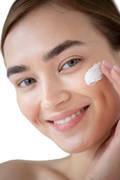
Removes dead skin cells for a more radiant look.
Inflammatory acne, particularly in its more severe forms (Grade 3-4), can be challenging to manage. This type of acne is characterized by red, swollen, and painful lesions, including papules, pustules, and nodules. For those struggling with moderate to severe acne, Intense Pulsed Light (IPL) therapy offers a promising solution.
What is IPL Treatment for Inflammatory Acne?IPL therapy is a non-invasive treatment that uses broad-spectrum light to target the deeper layers of the skin. It works by delivering precise pulses of light energy that penetrate the skin, reducing inflammation and destroying acne-causing bacteria (Propionibacterium acnes). This treatment also helps reduce sebum production, which can contribute to the development of acne, and improves the overall texture of the skin.
Why IPL is a Preferred Option for Inflammatory AcneIPL is favored by dermatologists for its ability to address multiple factors involved in acne formation, including bacteria, inflammation, and excess oil production. Unlike other treatments, IPL can treat acne without causing damage to the surrounding skin, making it a safer option for those with more sensitive or acne-prone skin. Additionally, IPL has the added benefit of reducing post-inflammatory hyperpigmentation (PIH), which is common in individuals with darker skin tones who suffer from acne.
Key Benefits of IPL Treatment for Inflammatory AcneIPL treatment is suitable for individuals with moderate to severe inflammatory acne (Grade 3-4) who have not responded well to traditional acne treatments. It’s particularly beneficial for those with sensitive or darker skin types who are prone to post-acne scarring and hyperpigmentation. However, it’s important to have a thorough consultation to ensure that IPL is the right treatment for your skin type and acne severity.
Expected Downtime and Symptoms
After an IPL session, some redness and mild swelling are common but usually subside within a few hours to a day. There is minimal to no downtime, and most patients can resume their normal activities immediately after treatment. However, it’s crucial to follow post-treatment care instructions to avoid any potential side effects, such as increased sensitivity to sunlight.
Typically, 3-5 sessions spaced 3-4 weeks apart are recommended for noticeable improvements.
IPL is generally well-tolerated, with most patients experiencing only a mild snapping sensation during treatment.
Yes, IPL can improve skin texture and reduce the appearance of acne scars by promoting collagen production.
After IPL treatment, your skin may be more sensitive to sunlight, so it’s important to use broad-spectrum sunscreen daily to protect your skin.
With proper skincare and maintenance, the results of IPL can last for several months. Follow-up sessions may be needed to maintain clear skin.